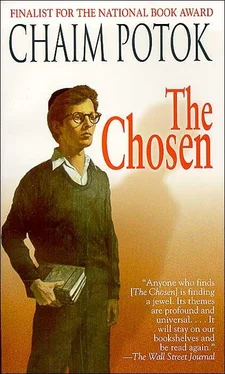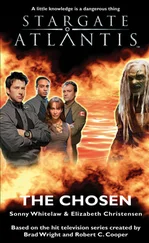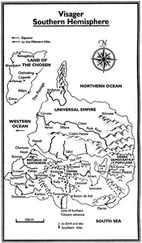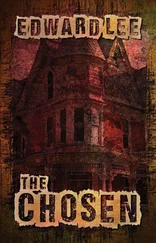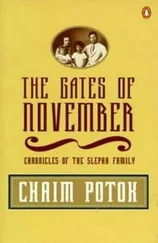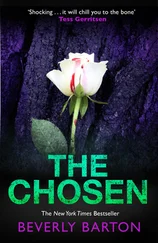We were approaching a group of about thirty black-caftaned men who were standing in front of the three-story brownstone at the end of the street. They formed a solid wall, and I did not want to push through them so I slowed my steps, but Danny took my arm with one hand and tapped his other hand upon the shoulder of a man on the outer rim of the crowd. The man turned, pivoting the upper portion of his body – a middle-aged man, his dark beard streaked with gray, his thick brows edging into a frown of annoyance – and I saw his eyes go wide. He bowed slightly and pushed back, and a whisper went through the crowd like a wind, and it parted, and Danny and I walked through, Danny holding me by the arm and nodding his head at the greetings in Yiddish that came in quiet murmurs from the people he passed. It was as if a black waved, frozen sea had been sliced by a scythe, forming black, solid walls along a jelled path. I saw black and graybearded heads bow toward Danny and dark brows arch sharply over eyes that stared questions at me and at the way Danny was holding me by the arm. We were almost halfway through the crowd now, walking slowly together, Danny's fingers on the part of my arm just over the elbow. I felt myself naked and fragile, an intruder, and my eyes, searching for anything but the bearded faces to look at, settled, finally, upon the sidewalk at my feet. Then, because I wanted something other than the murmured greetings in Yiddish to listen to, l began to hear, distinctly, the tapping sounds of Danny's metal-capped shoes against the cement pavement. It seemed a sharp, unnaturally loud sound, and my ears fixed on it, and I could hear it clearly as we went along. I listened to it intently – the soft scrape of the shoe and the sharp tap-tap of the metal caps – as we went up the stone steps of the stairway that led into the brownstone in front of which the crowd stood. The caps tapped against the stone of the steps, then against the stone of the top landing in front of the double door -and I remembered the old man I often saw walking along Lee Avenue, moving carefully through the busy street and tapping, tapping, his. metal-capped cane, which served him for the eyes he had lost in a First World War trench during a German gas attack.
The hallway of the brownstone was crowded with black-caftaned men, and there was suddenly a path there, too, and more murmured greetings and questioning eyes, and then Danny and I went through a door that stood open to our right, and we were in the synagogue.
It was a large room and looked to be the exact size of the apartment in which my father and I lived. What was my father's bedroom was here the section of the synagogue that contained the Ark, the Eternal Light, an eight-branched candelabrum, a small podium to the right of the Ark, and a large podium about ten feet in front of the Ark. The two podiums and the Ark were covered with red velvet. What was our kitchen, hallway, bathroom, my bedroom, my father's study and. our front room, was here the portion of the synagogue where the worshipers sat.
Each seat consisted of a chair set before a stand with a sloping top, the bottom edge of which was braced with a jutting strip of wood to prevent what was on the stand from sliding to the floor. The seats extended back to about twenty feet from the rear wall of the synagogue, the wall opposite the Ark. A small portion of the synagogue near the upper door of the hallway had been curtained off with white cheesecloth. This was the women's section. It contained a few rows of wooden chairs. The remaining section of the synagogue, the section without chairs, was crowded with long tables and benches. Through the middle of the synagogue ran a narrow aisle that ended at the large podium. The walls were painted white. The wooden floor was a dark brown. The three rear windows were curtained in black velvet. The ceiling was white, and naked bulbs hung from it on dark wires, flooding the room with harsh light.
We stood for a moment just inside of the door near one of the tables. Men passed constantly in and out of the room. Some remained in the hallway to chat, others took seats. Some of the seats were occupied by men studying Talmud, reading from the Book of Psalms, or talking among themselves in Yiddish. The benches at the tables stood empty, and on the white cloths that covered the tables were paper cups, wooden forks and spoons, and paper plates filled with pickled herring and onion, lettuce, tomatoes, gefiilte fish, Shabbat loaves – the braided bread called chalah – tuna fish, salmon, and hard-boiled eggs. At the edge of the table near the window was a brown leather chair. On the table in front of the chair was a pitcher, a towel, a saucer, and a large plate covered with a Shabbat cloth – a white satin cloth, with the Hebrew word for the Shabbat embroidered upon it in gold. A long serrated silver knife lay alongside the plate.
A tall, heavyset boy came in the door, nodded at Danny, then noticed me, and stared. I recognized him immediately as Dov Shlomowitz, the player on Danny's team who had run into me at second base and knocked me down. He seemed about to say something to Danny, then changed his mind, turned stiffly, went up the narrow aisle, and found a seat. Sitting in the seat, he glanced at us once over his shoulder, then opened a book on his stand, and began to sway back and forth. I looked at Danny and managed what must have been a sick smile. 'I feel like a cowboy surrounded by Indians,' I told him in a whisper.
Danny grinned at me reassuringly and let go of my arm. 'You're in the holy halls,' he said. 'It takes getting used to.'
'That was like the parting of the Red Sea out there,' I said. 'How did you do it?'
'I'm my father's son, remember? I'm the inheritor of the dynasty. Number one on our catechism: Treat the son as you would the father, because one day the son will be the father.'
'You sound like a Mitnaged,' I told him, managing another weak smile.
'No, I don't' he said. 'I sound like someone who reads too much. Come on. We sit up front. My father will be down soon.'
'You live in this house?'
'We have the upper two floors. It's a fine arrangement. Come on. They're beginning to come in.'
The crowd in the hallway and in front of the building had begun coming through the door. Danny and I went up the aisle. He led me to the front row of seats that stood at the right of the large podium and just behind the small podium. Danny sat down in the second seat and I sat in the third. I assumed that the first seat was for his father.
The crowd came in quickly, and the synagogue was soon filled with the sounds of shuffling shoes, scraping chairs, and loud voices talking Yiddish. I heard no English, only Yiddish. Sitting in the chair, I glanced over at Dov Shlomowitz, and found him staring at me, his heavy face wearing an expression of surprise and hostility, and I suddenly realized that Danny was probably going to have as much trouble with his friends over our friendship as I would have with mine. Maybe less, I thought. I'm not the son of a tzaddik. No one steps aside for me in a crowd. Dov Shlomowitz looked away but I saw others in the crowded synagogue staring at me too, and I looked down at the worn prayer book on my stand, feeling exposed and naked again, and very alone.
Two gray-bearded old men came over to Danny, and he got respectfully to his feet. They had had an argument over a passage of Talmud, they told him, each of them interpreting it in a different way, and they wondered who had been correct. They mentioned the passage, and Danny nodded, immediately identified the tractate and the page, then coldly and mechanically repeated the passage word for word, giving his interpretation of it, and quoting at the same time the interpretations of a number of medieval commentators like the Me'iri, the Rashba, and the Maharsha. The passage was a difficult one, he said, gesticulating with his hands as he spoke, the thumb of his right hand describing wide circles as he emphasized certain key points of interpretation, and both men had been correct; one had unknowingly adopted the interpretation of the Me'iri, the other of the Rashba. The men smiled and went away satisfied. Danny sat down.
Читать дальше
